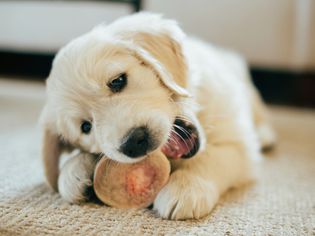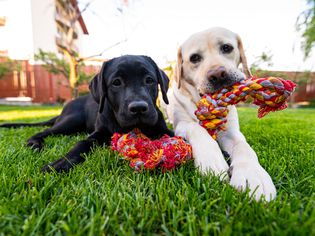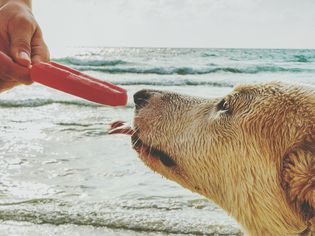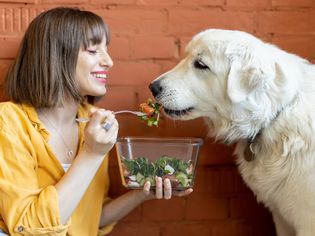This Is Why Some Dogs Lean on People
Is your dog a leaner? It might stand or sit by your legs and put much of its weight on you. Leaning is common in dogs, especially large and giant dog

Dogs love to chew on bones. And we dog lovers want to give dogs what they want. So, we often give our dogs big delicious bones that make them so happy. However, this might not be the safest way to treat your dog.
In general, bones are not the safest or healthiest treats for dogs. Most bones are dangerous for dogs because they can cause certain health problems. While not all pet experts agree on this topic, most veterinary health professionals can tell you plenty of bone-related horror stories.
The longtime assumption that bones are appropriate canine treats is off track. Cooked bones are the riskiest. Raw bones, on the other hand, are a subject of debate because they are softer and potentially more digestible. However, raw bones are not completely safe. The same goes for other raw parts, such as chicken feet.
Some dogs will chew bones their whole lives and never experience an issue. Others will have an emergency with just one bone. In part, it depends on the chewing style of the dog. The size, shape, and type of bone is also a factor. Unfortunately, much depends on luck.
There are several potential complications associated with bones and dogs. These problems can occur in dogs after eating bones, even if they are raw bones.
Sure, dogs love bones, but it doesn’t mean they should all be allowed to eat them. The risks associated with feeding bones to dogs apply to bones from all kinds of animals, whether they are raw or cooked. However, the risks are highest with cooked bones, especially those from poultry because they tend to splinter.
If you wish to feed your dog raw meaty bones, talk to your vet about raw turkey necks. Not all experts agree that they are safe, but they are comprised mainly of cartilage and soft bones. Therefore, they may be considered digestible when raw. However, raw food also comes with risk, including salmonella or septicemia, a severe blood infection. Additionally, humans in the house could be at risk of salmonella from cleaning up the remains of the turkey neck or picking up pet waste that contains them.
Animal hooves and antlers can be equally dangerous. The size of your dog is not necessarily a factor either; any type of dog can be affected. However, small dogs eating large bones are obviously at a greater risk.
Even if you have given bones to your dog in the past without complications, it does not mean that everything will turn out fine the next time you feed a bone. Be sure you understand the risks before giving your dog any type of bone or chew. Then, make sure you supervise your dog's chewing in case something goes wrong.
Chewing is instinctively necessary for dogs. To help satisfy your dog's need to chew without giving bones, look for safer alternatives. No matter what you give your dog to chew on, always be certain that you supervise your dog.
Specially made dog toys, dental chews, and other dog treat varieties can be excellent ways to satisfy your dog's need to chew. Again, be sure to talk to your veterinarian about the best options for your dog.
Use caution when discarding bones that are leftover from food. Your best bet is to take them directly to the outside trash provided it is out of your dog's reach. Treat bones as you would all other foods that are toxic to dogs.
If you suspect your dog has experienced a bone-related complication, contact a veterinarian immediately.

Is your dog a leaner? It might stand or sit by your legs and put much of its weight on you. Leaning is common in dogs, especially large and giant dog

Should you allow your dog to get on the couch? Is it okay to let your dog sleep in your bed? Should dogs be allowed on furniture at all? These are pre

One of the most common non-food items for dogs to eat are rocks, but why do dogs eat rocks in the first place? The consumption of non-food items that

We have all heard the common phrase the dog days of summer, and, sometimes, to beat the heat, popsicles are a great option to keep cool. But is it ok

Rosemary, a woody herb, has aromatic leaves that are often used in cooking. It also has many reported health benefits, ranging from antibacterial prop

Can dogs eat popcorn? Yes, they can have a few bites, but there are some kernels of information you need to know before sharing your movie-time snack
We are an information hub dedicated to delivering clear, trustworthy, and engaging content across a wide spectrum of topics — from innovation and trends to daily life, wellness, and global developments.
Our team is passionate about creating content that helps people stay curious, make informed decisions, and understand the world with greater clarity and context.
With a focus on quality, relevance, and accessibility, we aim to offer a meaningful experience for everyone seeking knowledge, ideas, and thoughtful perspectives.